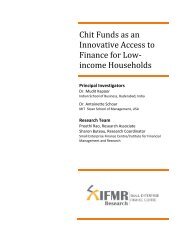Government of India Volume I: Analysis and Recommendations
Government of India Volume I: Analysis and Recommendations
Government of India Volume I: Analysis and Recommendations
You also want an ePaper? Increase the reach of your titles
YUMPU automatically turns print PDFs into web optimized ePapers that Google loves.
SYSTEMIC RISK<br />
Table <strong>of</strong> <strong>Recommendations</strong> 9.7 Designation as Systemically Important Financial<br />
Institutions<br />
◮ The FSDC will agree on the methodology for identifying SIFIs, which will embrace global st<strong>and</strong>ards to the<br />
extent possible for the <strong>India</strong>n financial system. All the recommendations for the regulation-making process<br />
put forth by the Commission will be enforced on the construction <strong>of</strong> the methodology;<br />
◮ Using this methodology, the FSDC will identify SIFIs. The list <strong>of</strong> such institutions will be released into the public<br />
domain annually;<br />
◮ SIFIs will have the choice <strong>of</strong> appealing their designation at the appellate tribunal;<br />
◮ This designation will be used by micro-prudential regulators, <strong>and</strong> by the resolution corporation, to exercise<br />
a higher st<strong>and</strong>ard <strong>of</strong> regulation <strong>and</strong> supervision; <strong>and</strong><br />
◮ The FSDC will monitor the higher st<strong>and</strong>ard <strong>of</strong> regulation <strong>and</strong> supervision by the regulatory agencies.<br />
Financial firms can be adversely affected by being designated systemically important<br />
<strong>and</strong> being called upon to face higher regulatory st<strong>and</strong>ards <strong>and</strong> supervisory focus.<br />
The Commission therefore believes that financial firms must have an opportunity to appeal<br />
this designation to ensure that the FSDC’s decisions comport with basic principles <strong>of</strong><br />
regulatory governance.<br />
The process followed in this field must, hence, follow a carefully structured set <strong>of</strong><br />
steps, as detailed in Table 9.7.<br />
9.7. System-wide measures<br />
Financial regulators worldwide are gradually evolving measures for regulation which apply<br />
at a system scale. For example, measures that seek to resolve the problems caused<br />
by systemic cyclicality include the increase <strong>of</strong> capital requirements – across the financial<br />
system – in good times, <strong>and</strong> vice versa. This area also requires co-ordinated movement<br />
by all financial regulatory agencies. If, for example, capital requirements are raised in the<br />
banking sector alone, but not in other parts <strong>of</strong> the financial system, business will simply<br />
move away from banks, leading to regulatory arbitrage.<br />
Therefore, there is considerable interest worldwide in identifying appropriate measures<br />
for counter-cyclical capital variation that are applicable to the entire financial system,<br />
or large parts <strong>of</strong> the financial system. At the same time, systemic risk as a body <strong>of</strong><br />
pr<strong>of</strong>essional, scholarly <strong>and</strong> policy knowledge is relatively underdeveloped. Therefore the<br />
Commission proposes laying the legal foundations for one measure - the counter-cyclical<br />
capital buffer.<br />
The FSDC must conduct research <strong>and</strong> formulate a mechanism for the implementation<br />
<strong>of</strong> a counter-cyclical capital buffer such that it is applicable to the entire financial system,<br />
or large parts <strong>of</strong> the financial system - thus preventing concerns <strong>of</strong> regulatory arbitrage.<br />
Once such a measure has been formulated, the members <strong>of</strong> the FSDC will will move in<br />
unison to increase or decrease capital requirements in counter-cyclical fashion. It must<br />
be noted that the counter-cyclical capital buffer is in addition to each regulator’s power<br />
to specify capital requirements under its micro-prudential m<strong>and</strong>ate.<br />
Various types <strong>of</strong> system-wide measures which seek to resolve problems that are not<br />
solely cyclical in nature are also being debated internationally, such as sectoral capital<br />
requirements <strong>and</strong> leverage ratio requirements. In the coming decades, as the global<br />
consensus on such measures, as well as the experiences <strong>of</strong> countries in the use <strong>of</strong> such<br />
measures will increase, the FSDC may need to develop <strong>and</strong> authorise other system-wide<br />
measures.<br />
When such a scenario arises, the systemic risk law should be amended to provide the<br />
legal foundations <strong>of</strong> additional measures. The Commission recommends that the FSDC<br />
should research the applicability <strong>of</strong> other system-wide measures to the <strong>India</strong>n financial<br />
96 FINANCIAL SECTOR LEGISLATIVE REFORMS COMMISSION



